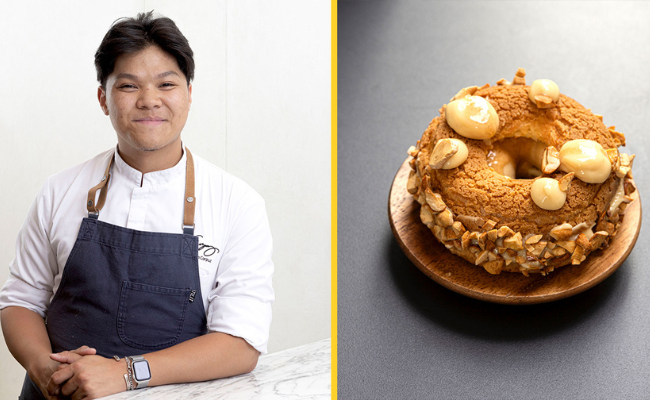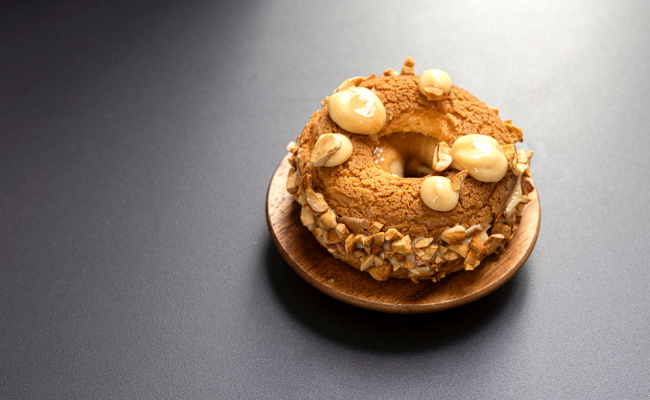Fil-Am pastry chef on success: You need to be ‘pragmatic, passionate, and psychotic’

Daniel Corpuz | Photo by Jar Concengco for F&B Report
For avid fans of chocolate and Netflix, you may already be familiar with Daniel Corpuz, the Filipino-American pastry chef, and chocolatier who participated in the reality series “School of Chocolate” after being fortuitously scouted on Instagram.
“There was a casting company working for Netflix on Instagram, and they were like, ‘Hey, I’m a producer. I’m looking for people who can work with chocolate. We think you’d be great. Would you be willing to do an interview?’” shares Corpuz. “It sounds like a scam because it’s this random person that messages you out of nowhere. But that’s just the culture over there.”
In a way, the Netflix series subverted the cutthroat competition format of reality TV in that no one was eliminated, and where knowledge sharing and personal growth (from Swiss-French pastry chef and chocolatier Amaury Guichon no less) were the heart and soul of the show. Mashable even called this “a new standard” where there’s “less yelling, more teaching, fewer discouraging failures, and more chocolate pterodactyls.”
“Post-show, one lesson I learned was to look at all the basics. If you look at my Instagram, there’s one block of time where it’s just pastry. That’s when I focused and relearned everything to the point when the show came out people would ask me if I now knew how to make this or that, and I would say yes I practiced,” says Daniel Corpuz
That’s also essentially who Corpuz is as a person. Grounded, empathetic, and very much in touch with what we probably all need today. “We should never see ourselves at the top. There’s always someone or something above us. Also there’s somebody under us like a student that you can inspire. Which is why I enjoy this concept of teaching. It’s sharing knowledge.”
Born and raised in New York to parents who immigrated to the United States in the early ’90s (his mother is from Rosario, Pasig while his father is from Cubao), the Staten Island-based Corpuz studied at the Culinary Institute of America in New York, graduating with an associate in baking and pastry and a bachelor’s degree in business administration, before heading off into a whirlwind affair with Michelin-star restaurants such as The Modern, The Clocktower, One White Street, and Manhatta—until COVID hit.
View this post on Instagram
“I lost my job like most people in the food industry. I still remember that day. I came in that morning and made my production. Next thing you know, the chef was like, ‘We’re going to close for a week.’ And that week never ended.”
That long drought, however, was just the start for Corpuz. Having too much time “doing nothing” on his hands, Corpuz deftly handcrafted chocolate creations and posted them on Instagram, which then led him to the “School of Chocolate” opportunity.
“If COVID didn’t happen, I’ll be honest, the way this trajectory would have gone would be very traditional where you grind away and try to prove yourself to your chef and work your way up. That was the mentality.” But in the span of two and a half years, Corpuz harnessed this time for personal growth, which included opening his own shop and collaborating with Auro Chocolate early in 2023 and just recently with Half Saints.
“If COVID didn’t happen, I’ll be honest, the way this trajectory would have gone would be very traditional where you grind away and try to prove yourself to your chef and work your way up,” says Daniel Corpuz
“It’s quite exciting but also quite scary in the very back of my mind.”
Here, we caught up with the now 24-year-old pastry chef and chocolatier on utilizing Filipino ingredients, what his creative approach is, and why he describes himself as “psychotic” (in a good way).
Tell us a little more about your background growing up in New York.
Growing up, I was the eldest, and we still had a very Filipino household. We would speak Tagalog at home and English outside. I’m grateful for that because I’m able to speak Tagalog now. I have three younger brothers. The bunso is 12 years old, and he can’t speak Tagalog at all.
My parents aren’t the biggest cooks at home. Si mommy lang ang nagluluto. Growing up I was the pickiest eater. I would only eat rice. No ulam, no sauce. Just plain white rice. And I always joke that I should technically be dead right now as a malnourished child. It was in middle school when I grew interested in baking. It was around that time that a lot of the cake and cupcake shows were on television. That’s where I started as well.
View this post on Instagram
What was your first memory of chocolate?
I think it would have to be Halloween. It’s not even the best chocolate—it’s the commercialized chocolate. But even on top of that, I don’t think I was the biggest chocolate eater as a kid. I always gravitated towards the sour jelly candies. And I always liked vanilla over chocolate. Chocolate became more of a thing for me during middle school.
You utilize Filipino and Asian ingredients and flavors into your chocolates. Tell us more about your approach and creative process.
In the US, ube is definitely growing. There are still people who say, ‘What’s oob?’ I’m just like, ‘Well it’s purple yam.’ As a chef, the way I market some of my flavors—I have calamansi and pandan—it’s always just describing what it is and trying to connect the flavor with something else. For ube, I explain it as a purple yam with an intense vanilla flavor with a hint of nuttiness.
“Food is becoming like a very Grant Achatz, Alinea-esque thing where it’s not just tasting it; you’re feeling it, smelling it. And that’s such a big thing where people are looking for a more positive experience, where it’s more than just food.”
There are definitely more flavors that aren’t that well-known yet like calamansi or pandan. When people talk about calamansi, they’re always describing it as ‘Oh it’s like a lime, it’s like a lemon’ and I’m like ‘No, calamansi is calamansi. You know how people know what yuzu is now? It’s not a lemon or a lime, it’s yuzu. So it’s that same idea when I introduce the flavor of calamansi. For pandan, it’s a screwpine leaf. The way I’d describe it so that people are more willing to try it is that it’s reminiscent of green tea and matcha-esque. But instead of the bitterness it’s almost a sweet and floral fragrance.
What are some of the lesser-known/used Filipino ingredients that you actually enjoy using?
Calamansi is the main one. The last pop-up in Times Square, I had ube ice cream. People only care about ube ice cream at these pop-ups. I cannot express it enough. The second item that we sold was calamansi iced tea. It’s crazy because Wendy’s here [in the Philippines] has calamansi iced tea. It’s a normal thing to drink here. But in the US, people are like what is this? But they love it. My mission is to get calamansi to where yuzu is.

The sans rival Paris-Brest (made with sheets of meringue, cake, buttercream, and cashew) of Daniel Corpuz from his collaboration with Half Saints | Photo by Jar Concengco for F&B Report
How would you describe the Filipino-American community in New York City?
A lot of Filipinos in New York are based in Queens. There’s a street that was dedicated as Little Manila. Jollibee is growing—there’s a Jollibee every other place now when there used to be none. People are quick to relate Filipino cuisine to lumpia and ube but I think now more and more smaller Filipino businesses and chefs are also redefining what Filipino food is in the US. So going back to their roots and having that inspiration.
But building on their own experiences is somewhat elevating Filipino cuisine in the US. I’m friends with a business that sells isaw, Mag Wheels, kwek-kwek. You have non-Filipinos buying 20 isaws and Mag Wheels. Ten years ago, people wouldn’t ever eat that. Intestines?!
View this post on Instagram
Is there anything from the Filipino culture that informs your approach to your brand?
I think growing up in a Filipino household, it’s that sense of family and community. Growing up in Staten Island, seven out of eight households were Filipino on a block that was mostly Hasidic Jewish. So when it came to New Year’s, we were the only ones that were so loud on the block. I very much remember Filipino parties and barbecues, me running around with my Nerf gun with friends, my dad and titos in the back ‘karaokeing’ it up with drinks. That’s how it was growing up.
Now it’s not just ‘family family’ but found family—Filipino business owners. To do these pop-ups, we grind away and spend hours and hours to prep. And at the end we celebrate. I don’t want my menu or products to be not approachable to Filipinos but also as a business, my demographic for a gift item, that’s what I tell my team that we sell. We sell gifts and experiences —our demographic will ultimately shift but to never forget the crux of what it is.
View this post on Instagram
Lastly, what skills do you need to be a successful pastry chef today?
I always describe myself in three words. First, pragmatic because as a chef sometimes you don’t have time for anything so you have to be pragmatic.
You have to be f*cking insane. You have to be psychotic enough—in a good way—to work over 80 hours for yourself or for whatever restaurant you’re working for, to wear 10 different hats. Of course you want to create and produce but you also have to be HR, you have to be an accountant, you have to be the social media team, you have to do marketing. That’s the psychotic aspect.
You put a lot of yourself out there. I’m not saying that if you’re an introvert you’re not going to succeed. But you have to realize that there’s a lot more to it. Your product still has to speak for itself. As long as your product is up to par, up to standard, and up to quality, you can flourish. You just have to be crazy somehow to want to own a business.
I think now people are understanding how much work it takes as a chef. On my last trip here, I just watched ‘The Menu.’ A lot of students at Enderun asked if that was real. And yes—that experience, that devotion to the restaurant and the job, the fact that the people you work with are practically your family because you give up your holidays.
So the three words that I describe myself as—pragmatic, psychotic, and the last one is passionate because at the end of the day we just have this love for food. We love what we’re doing and that’s why we stay because it’s definitely not for the money.
Interview has been edited for clarity

